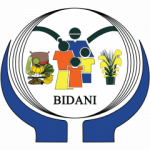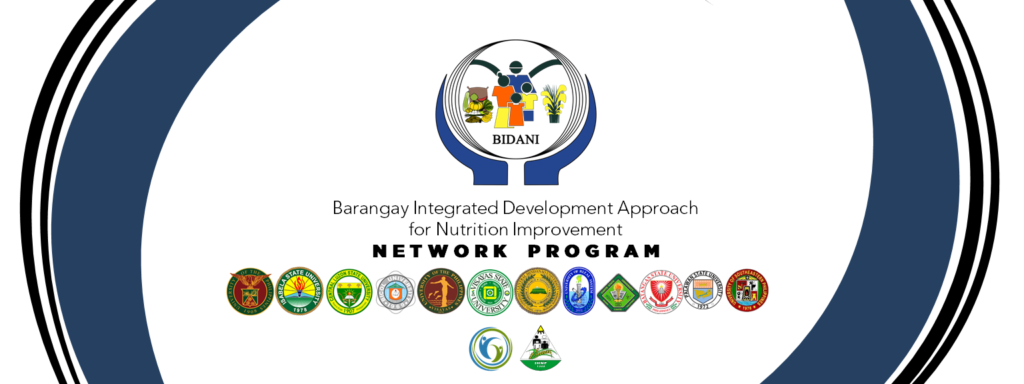The Barangay Integrated Development Approach for Nutrition Improvement (BIDANI) is a comprehensive nutrition-in-development strategy emphasizing the need to mainstream improving the nutrition of Filipinos towards achieving sustainable development.
BIDANI traces its roots in the Nutrition Improvement Model (NIM) formulated in 1978 by the University of the Philippines Los Baños (UPLB). It was an action research program funded by the UN Food and Agriculture Organization (FAO), German World Hunger Assistance Program, National Nutrition Council (NNC), and the then National Science and Technology Authority (NSTA). Starting with six rural barangays with varying agro-ecological settings in five municipalities and one city in the provinces of Laguna and Batangas, it then expanded to 12 more barangays in 1980, and an additional 50 barangays in 11 east Laguna towns in 1984.
In 1984, the NIM evolved into BIDANI. The following year, 1985, BIDANI as a network program composed of various state colleges and universities (SUCs) across the Philippines was established. Starting with five SUCs that were trained to replicate the BIDANI strategy through research and project activities, the network kickstarted with funding support from the National Nutrition Council (NNC) and Philippine Council for Agriculture, Aquatic and Natural Resources Research and Development (PCAARRD). These two agencies funded the program from 1986 to 1989.
To strengthen the network program, which is now composed of seven SUCs, a five-year bilateral assessment grant was granted by the Netherlands Government Directorate for Development Cooperation (DGIS). Phase I was conducted from 1990 to 1991, while Phase 2 commenced in 1996 and lasted until 2000, owing to the exemplary performance of the SUCs.
In the year 2000, the University of the Philippines Board of Regents (BOR) formally institutionalized BIDANI in UPLB and UP Visayas during the Board’s 1144th Meeting on 31 August 2000. The Board’s resolution cites BIDANI as a demonstration of “the technical assistance and leadership UP provides in strengthening the extension mandate of sister academic institutions of higher learning around the country.”
As of 2023, there are 8 member SUCs under the BIDANI Network Program – including UPLB, which serves as the national coordinator – spanning 647 barangays in six cities and 32 municipalities, 11 provinces, and eight regions throughout the Philippines.
BIDANI serves as the academe’s unique and continuing contribution to national development, owing to the sustainability of the BIDANI strategy. On the side of governance, it enables local leaders and their people to appropriately intervene directly and indirectly in solving problems regarding nutrition and development through the Barangay Integrated Development Approach (BIDA). It also institutionalizes effective and efficient development program planning and implementation through the Barangay Management Information System (BMIS). In terms of its nutrition components, BIDANI contributes to the reduction of malnutrition prevalence in barangays covered by the network program through the Participative Nutrition Enhancement Approach (PNEA).


As a strategy
- BIDANI uses a systematic and community-based approach of planning involving all actors to prioritize activities
- BIDANI infuses nutrition as an objective, a component, an outcome, and an indicator of development through community advocacy and sharing the responsibility for nutrition
- BIDANI is a holistic, comprehensive, integrated, multi-sectoral strategy which invites concerted efforts among participant-beneficiaries
- BIDANI operates on a bottom-up approach which works on the principle that development plans and programs can only be meaningful and sustainable if they are responsive to and reflective of the actual conditions and needs of the communities, and their development projects/activities are best suited to their needs
As a program
- As an extension program, BIDANI was conceived and modelled by UPLB in 1978 and expanded to at least 35 SUCs in support to the Philippine Plan of Action for Nutrition (PPAN) to operationalize the nutrition-in-development policy and the government’s Local Autonomy Decentralization Program
- It is a program initiated by the SUCs, implemented by the barangays with the support of the LGUs. It supports the Social Reform Agenda of the government
- As a nutrition-oriented development program at local government levels, it propagates several innovative project components that complement development projects identified by the people themselves

